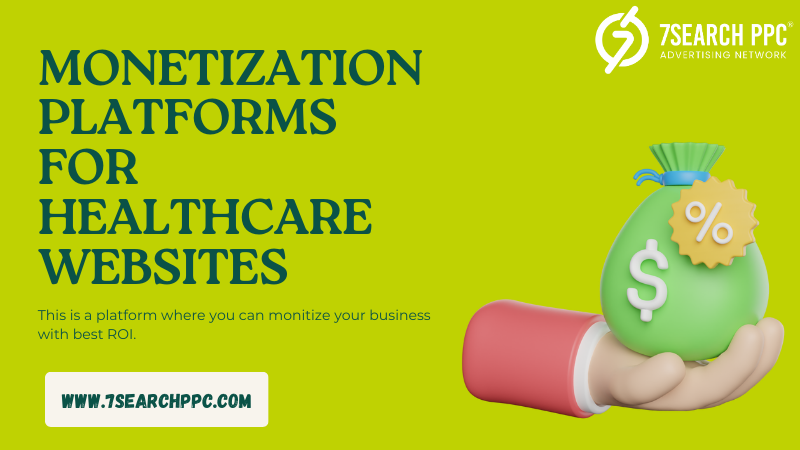Effective Monetization Platforms for Healthcare Websites: A Complete Guide

Strong 8k brings an ultra-HD IPTV experience to your living room and your pocket.
The healthcare industry has experienced a digital transformation, and healthcare websites have become essential tools for providing information, services, and even treatment options to a vast audience. Whether you're running a medical blog, a health resource hub, or a telemedicine platform, effectively monetizing your healthcare website is crucial to sustaining and growing your online presence. This guide outlines some of the most effective monetization platforms for healthcare websites, offering actionable insights for generating revenue while maintaining high standards of trust, privacy, and quality content.
Affiliate Marketing: Promoting Healthcare Products and Services
Affiliate marketing is one of the most common and effective monetization strategies for healthcare websites. By partnering with trusted healthcare companies, website owners can earn commissions by promoting health-related products, services, and online resources.
For healthcare websites, affiliate marketing can include promoting supplements, medical devices, wellness programs, insurance plans, or even telemedicine services. Platforms like Amazon Associates, ShareASale, and Commission Junction (CJ) offer access to various healthcare-related affiliate programs.
Why Affiliate Marketing Works for Healthcare Websites:
- Wide Range of Products: There’s a broad selection of healthcare-related products to promote, from fitness equipment to vitamins and health insurance policies.
- Non-Intrusive: Affiliate links can be seamlessly integrated into content, like health tips, blog posts, or product reviews, without disrupting the user experience.
- Recurring Commissions: Many healthcare affiliate programs offer recurring commissions, especially if you’re promoting subscription-based services like health apps or online fitness programs.
Potential Challenges:
- Building Trust: Healthcare is a sensitive subject, and readers are likely to be cautious about recommendations. Building trust through credible, well-researched content is essential.
- Compliance and Disclosure: Websites must clearly disclose affiliate relationships to stay compliant with regulations, including those of the Federal Trade Commission (FTC).
Sponsored Content: Partnering with Health Brands
Sponsored content involves collaborating with healthcare brands or companies to create articles, blog posts, videos, or even infographics. These pieces are often published in exchange for payment, and they usually promote the sponsor’s products or services.
For healthcare websites, sponsored content can focus on reviewing healthcare products (such as supplements, medical devices, or wellness tools), discussing the benefits of a particular treatment, or covering advancements in medical technology.
Why Sponsored Content Works for Healthcare Websites:
- Revenue Potential: Sponsored content often offers higher revenue than other monetization methods, especially when you have a solid readership base.
- Quality Partnerships: By partnering with reputable health brands, you can provide valuable information to your audience while generating income.
- Content Flexibility: Sponsored content allows for more flexibility in content creation. You can align the content with your website’s voice while fulfilling the sponsor’s requirements.
Potential Challenges:
- Maintaining Credibility: Sponsored content must be transparent and genuinely beneficial to your audience to avoid harming your site’s credibility.
- Finding Suitable Sponsors: Securing the right sponsors who align with your website’s mission and values can be a time-consuming process.
Subscription and Membership Models: Offering Premium Health Content
Subscription-based monetization models are becoming increasingly popular in healthcare websites, especially for those that provide in-depth resources, educational content, or access to exclusive services. This model works by offering free content and services to attract users and then providing access to premium content, consultations, or health programs in exchange for a subscription fee.
Platforms like Patreon and MemberPress allow healthcare websites to set up membership areas where users can pay for access to premium health-related content, webinars, or even personalized healthcare advice.
Why Subscription Models Work for Healthcare Websites:
- Steady Revenue: Subscriptions provide a predictable, recurring revenue stream, which can be essential for long-term growth.
- Exclusive Content: You can offer high-quality, exclusive content such as in-depth health guides, expert webinars, or one-on-one consultations.
- Loyal Audience: Subscribers who pay for premium content tend to be more engaged and loyal, providing valuable long-term relationships.
Potential Challenges:
- Content Demands: To keep subscribers engaged, you must consistently produce high-quality, exclusive content.
- Acquiring Subscribers: It can take time to build a subscriber base, particularly if your website is relatively new or if your premium content isn’t yet well-established.
Online Health Courses and Digital Products
Another effective monetization strategy for healthcare websites is creating and selling online courses, eBooks, or digital resources. If your healthcare website focuses on education, wellness, fitness, or medical knowledge, offering online courses or downloadable resources can provide a significant revenue stream.
Platforms like Teachable, Thinkific, and Gumroad make it easy for healthcare providers to create and sell digital products. Courses could cover topics such as nutrition, fitness, mental health, or specific medical conditions, while digital products can include workout plans, meal plans, or health trackers.
Why Selling Digital Products Works for Healthcare Websites:
- Scalable: Once created, digital products and courses can be sold repeatedly without incurring additional costs.
- Expert Positioning: Offering educational content positions your website as an authority in the healthcare space.
- High Profit Margins: Digital products have minimal overhead, leading to high profit margins once they’re developed.
Potential Challenges:
- Course Creation Effort: Creating high-quality online courses or digital resources requires significant time and expertise.
- Marketing Efforts: To successfully sell your digital products, effective marketing strategies are essential to reach the right audience.
Telemedicine Services: Offering Remote Consultations
If your healthcare website is associated with a medical practice or healthcare professionals, offering telemedicine services can be an excellent monetization option. With the rise of virtual healthcare, patients are increasingly seeking remote consultations for medical advice, mental health support, and other healthcare needs.
Healthcare providers can monetize their websites by offering telemedicine appointments through platforms like Teladoc, Doxy.me, or Zocdoc, which facilitate video consultations, secure messaging, and appointment booking.
Why Telemedicine Services Work for Healthcare Websites:
- Increasing Demand: Telehealth is growing in popularity, especially after the COVID-19 pandemic, as patients appreciate the convenience of remote consultations.
- Recurring Revenue: If you’re offering ongoing consultations or subscription-based services, telemedicine can generate recurring revenue.
- Convenience for Patients: Many patients prefer the convenience of receiving healthcare advice remotely, which can lead to higher satisfaction and repeat visits.
Potential Challenges:
- Regulatory Compliance: Telemedicine services are heavily regulated, and you must ensure compliance with laws like HIPAA (Health Insurance Portability and Accountability Act) to protect patient privacy.
- Technology Requirements: Offering telemedicine services requires a reliable video conferencing platform, secure payment systems, and scheduling tools.
Advertising: Displaying Health-Related Ads
Displaying advertisements on your healthcare website is another common monetization method. Google AdSense and other ad networks allow you to display health-related ads on your site, earning money whenever users click on the ads or view them.
Healthcare websites can also sell ad space directly to healthcare brands, pharmaceutical companies, or wellness providers.
Why Advertising Works for Healthcare Websites:
- Passive Revenue: Once set up, ads generate passive income without requiring much ongoing effort.
- Targeted Ads: Platforms like Google AdSense allow for highly targeted ad placements, ensuring that the ads are relevant to your audience’s interests.
- Scalability: As your website’s traffic grows, so does your potential ad revenue.
Potential Challenges:
- Ad Clutter: Too many ads can clutter the user experience and distract from the core content, reducing visitor engagement.
- Revenue Variability: Ad revenue can be inconsistent, depending on factors like traffic volume, ad performance, and ad network quality.
Donations and Crowdfunding: Raising Funds for Health Initiatives
If your healthcare website is dedicated to raising awareness for specific health issues, charitable causes, or providing free educational resources, crowdfunding or accepting donations can be a viable monetization option. Platforms like GoFundMe, Kickstarter, or Ko-fi allow you to collect funds directly from your audience.
Why Donations and Crowdfunding Work for Healthcare Websites:
- Community Support: If your website is dedicated to a meaningful cause, people may be willing to contribute financially to help further your mission.
- No Need for Sales: Unlike product-based monetization models, donations do not require you to sell anything to generate income.
Potential Challenges:
- Inconsistent Revenue: Donations and crowdfunding often provide irregular revenue and are dependent on external factors like public interest or awareness campaigns.
- Effort in Engagement: You need to continuously engage your audience and show them how their contributions are making an impact.
Conclusion
In 2025, healthcare websites have numerous opportunities to monetize their platforms, ranging from affiliate marketing and sponsored content to telemedicine services and digital products. The key to success lies in selecting a monetization strategy that aligns with your website's mission and audience while maintaining a focus on quality, privacy, and trust. By diversifying your revenue streams and continuously adding value to your users, you can build a sustainable, profitable healthcare website that supports both your financial goals and the needs of your audience.
Note: IndiBlogHub features both user-submitted and editorial content. We do not verify third-party contributions. Read our Disclaimer and Privacy Policyfor details.







